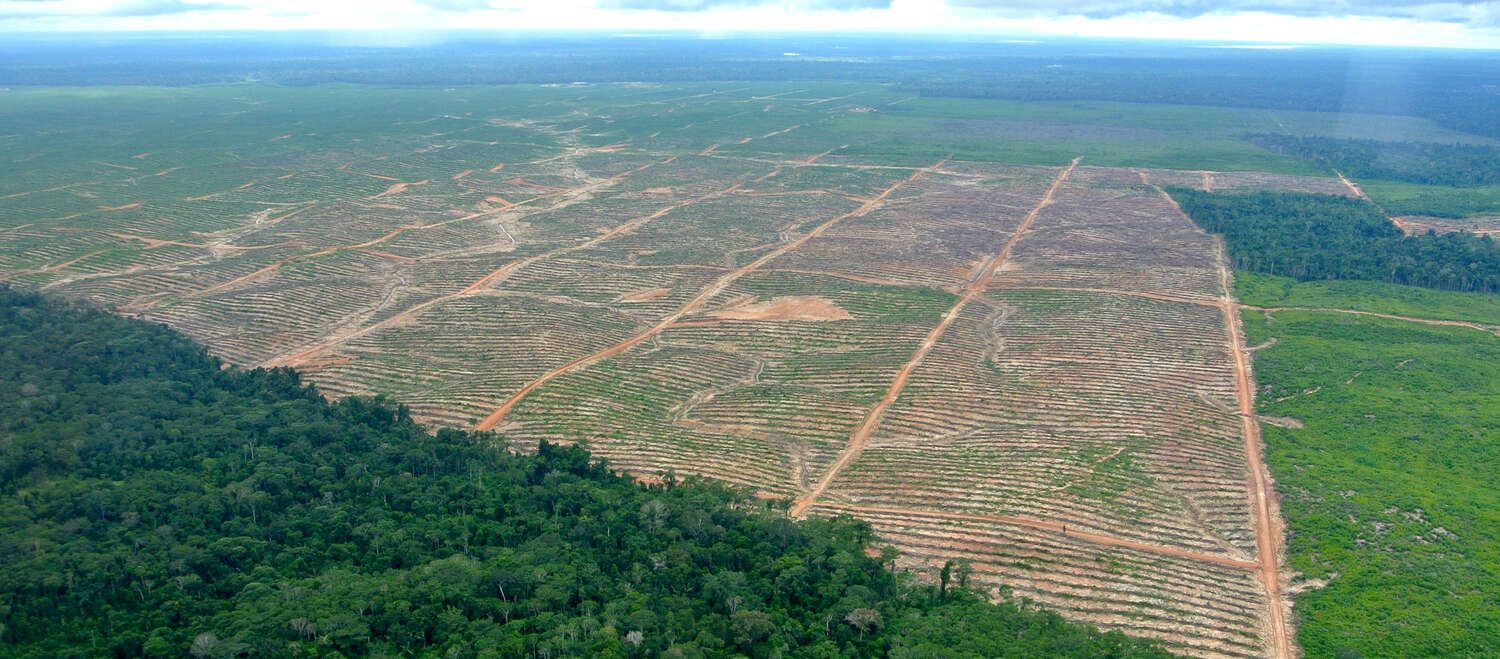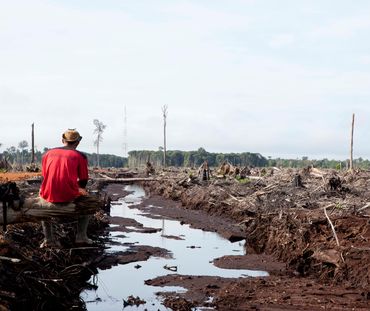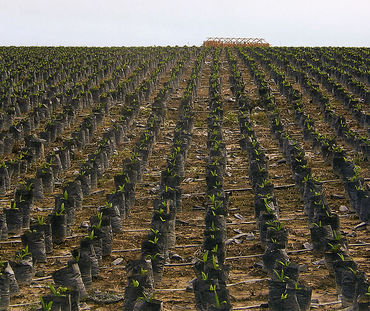Fact check: Nestlé palm oil is not sustainable
In 2010, Nestlé pledged that it would only use deforestation-free raw materials within ten years. And how has the food giant lived up to its promise? To date, it cannot rule out rainforest destruction for nearly a third of the palm oil it uses. In 2019, Nestlé recorded more than 1,000 cases of deforestation per day. Development organizations also accuse Nestlé's palm oil suppliers of land conflicts, exploitation and child labor.
Nestlé, a multinational manufacturer of processed foods based in Switzerland, consumes large quantities of palm oil and has therefore been under heavy criticism for many years. The group used 455,000 tons of palm oil in 2019 alone.
The cultivation of the tropical oil not only destroys rainforests with their wealth of biodiversity and impacts the global climate, it also drives smallholders off their land, exploits plantation workers and some cases relies on child labor.
In 2010, Nestlé finally acknowledged the ugly reality of palm oil production by promising to create 100% deforestation-free supply chains within ten years. That time has now arrived, and a closer look at recent numbers published by Nestlé is more than sobering:
30% of Nestlé's palm oil is not free from deforestation
Only 62% of its palm oil can be traced back as far as the plantation, although the company does not specify which oil palm plantations are involved. According to Nestlé, 70% of its palm oil has come from verified deforestation-free cultivation since March 2020. 30% of its palm oil (136,500 tons) is from sources that are not traceable or not free of deforestation1. The data for 2019 cannot be verified independently.
A satellite rainforest monitoring service commissioned by Nestlé documented 388,047 cases of deforestation last year, the company admitted2. Nestlé then supposedly calls the palm oil suppliers and asks them if the clearing is related to them, explained the head of responsible procurement in a company video3.
Over 1,000 alarm messages per day
This claimed follow-up stretches credulity, considering that an average of more than 1,000 cases of deforestation are recorded daily. When taking only areas within 50 kilometers of the palm oil mills into account, 473,000 hectares of rainforest were cut down.
30% to 40% of deforestation cases are said to occur between the oil palm plantations that are connected to Nestlé’s suppliers, explains one of the commissioned consultants4. This works out to the destruction of 142,000 to 189,000 hectares of rainforest – an area roughly the size of London – every year.
24,000 hectares of rainforest cleared within the concessions
Within the oil palm concessions, Nestlé puts the clearing at “only 5% of the deforested area”, which is still almost 24,000 hectares (2019). However, Nestlé has not yet covered all of the concession boundaries in its supply chain, so the exact area cannot be confirmed, the company concedes.
1,735 palm oil suppliers from 24 countries
Nestlé is not naming the names of those behind the deforestation. The group’s list of palm oil suppliers dated April 20205 is extremely long, with 1,735 oil mills in 24 countries around the equator5. Of those suppliers, the food giant suspended only eight last year.
Nestlé does not disclose which oil palm plantations provide the raw material. In any case, there are probably tens of thousands of individual monocultures. Nestlé’s demand for such large quantities of palm oil undoubtedly creates huge incentives to start new plantations.
Most of the palm oil mills listed by Nestlé are located in Indonesia and Malaysia, which together account for about 90% of global palm oil production. The majority of the farms are owned by agricultural multinationals such as ADM, Bunge, Cargill, Olam and Wilmar – companies that environmental and development organizations have repeatedly accused of deforestation, human rights violations and pollution.
In Peru, Nestlé buys palm oil and other raw materials from the OLPESA oil mill, which, according to research by environmental journalists7 obtains palm oil from the Ocho Sur plantation company that cut down at least 12,000 hectares of Amazon rainforest8 and the ancestral land of the indigenous Shipibo of the village of Santa Clara de Ushunya9.
Several investigations and legal proceedings are ongoing in Peru against the Ocho Sur group (formerly Plantaciones de Pucallpa SAC and Plantaciones de Ucayali SAC), extending as high up as the country’s constitutional court10. In response to the allegations, the Norwegian state pension fund Norges Bank Investment Management (NBIM) divested from the largest Peruvian food company ALICORP, another buyer of OLPSEA palm oil11.
In Honduras, Nestlé buys palm oil from Exportadora del Atlantico, a company of the Dinent Group. In recent years, smallholder and human rights organizations have implicated the listed palm oil mill in Aguan Valley on the Atlantic Ocean in the killings of at least 140 people in a violent land conflict12.
At least 40 killings are said to be linked to Dinant (see Uncalculated Risks: Threats and attacks against human rights defenders and the role of development financiers pp. 38-40)13. In 2019, the authorities were able to arrest a fugitive former security guard of the Dinant Group who is accused of murdering three smallholders14.
In Malaysia, Nestlé buys palm oil from oil mills in Sabah state, according to the Swiss NGO Solidar Suisse in its 2019 report, Palmölbericht - Kinder- und Zwangsarbeit in Malaysia. Die Spur des billigen Palmöls führt in die Schweiz (Palm oil report – child and forced labor – the trail of cheap palm oil leads to Switzerland)15.
The NGO reports ruthless exploitation and forced labor on the oil palm plantations. A large proportion of the plantation workers – some 840,000 people – are illegal immigrants from Indonesia. These include an estimated 50,000 to 200,000 children. Due to the precarious situation of their parents, child labor is very widespread on the plantations that supply the oil mills.
In Indonesia, Nestlé is buying palm oil from PT Dua Perkasa Lestari through the Golden Agri Resources group, as the legal aid organization LBH and the environmental organization Walhi have determined16. The NGOs report a decades-long conflict between the plantation company and residents of Aceh province on Sumatra, documenting land grabbing, destruction of fields, systematic threats and expulsions. According to Walhi's measurements, the plantation lies on deep peat soil, thus violating environmental laws. Also, it is believed that the company does not have all the necessary permits and may thus be operating illegally.
Other plantations that are located in the Leuser ecosystem, like those of PT Dua Perkasa Lestari, have been under criticism for years, and their palm oil is sold worldwide through Wilmar’s oil mills17. According to a study by Rainforest Action Network, Wilmar also supplied Nestlé with palm oil from the protected area in 2017. Nestlé thus shares responsibility for massive deforestation of the habitat of endangered species such as the Sumatran orangutan, tiger, elephant and rhinoceros.
Conclusion
Nestlé pledged to ensure the palm oil it uses would be sourced in an environmentally friendly and socially responsible manner within ten years. It has not succeeded – despite the very long time it gave itself. While the Swiss-based multinational is pacifying consumers with PR promises, its business with cheap palm oil from obscure sources is booming. The price for this is being paid by people and nature in tropical countries. Rainforest Rescue therefore recommends avoiding products that contain palm oil.
1 https://www.nestle.com/sites/default/files/2020-05/nestle-deforestation-update.pdf
2 https://www.nestle.com/csv/raw-materials/palm-oil/palm-oil-transparency-dashboard
3 https://www.youtube.com/watch?v=gr2PKSEAC-M&feature=youtu.be
5 https://www.nestle.com/sites/default/files/2019-08/supply-chain-disclosure-palm-oil.pdf
6 https://www.nestle.com/sites/default/files/2020-06/palm-oil-producing-countries-regions-tables.pdf
9 https://es.mongabay.com/2018/03/peru-santa-clara-de-uchunya/
15 https://www.solidar.ch/sites/default/files/palmoel_report_2019_d-web.pdf
16 https://www.ran.org/leuser-watch/major-brands-and-banks-complicit/
17 https://www.mongabay.co.id/2017/03/18/laporan-ran-perambah-kawasan-ekosistem-leuser-tetap-terjadi/













